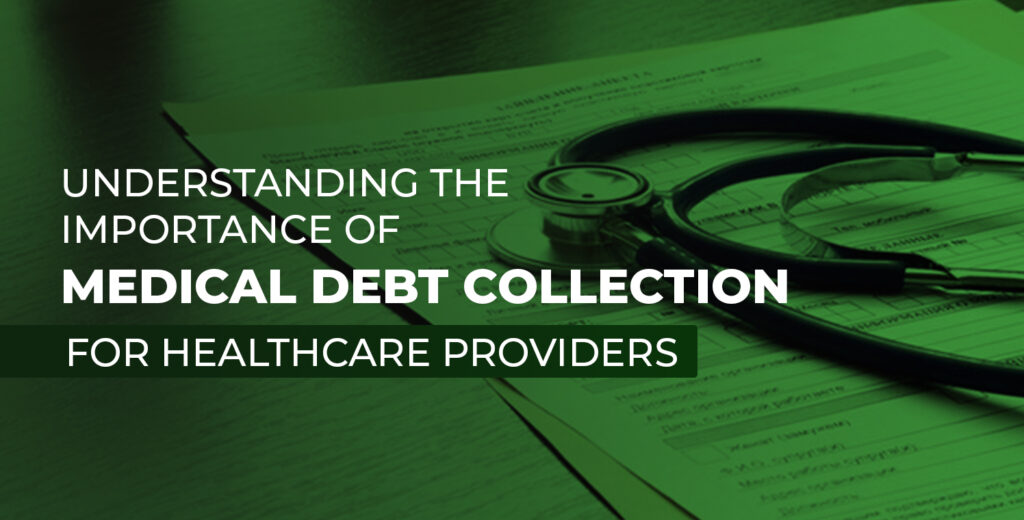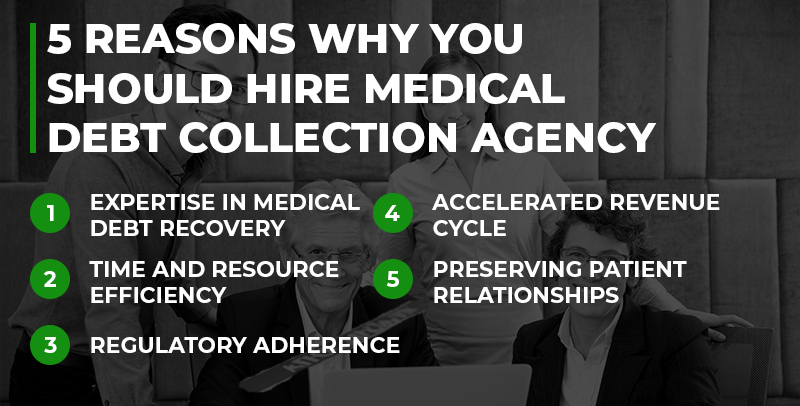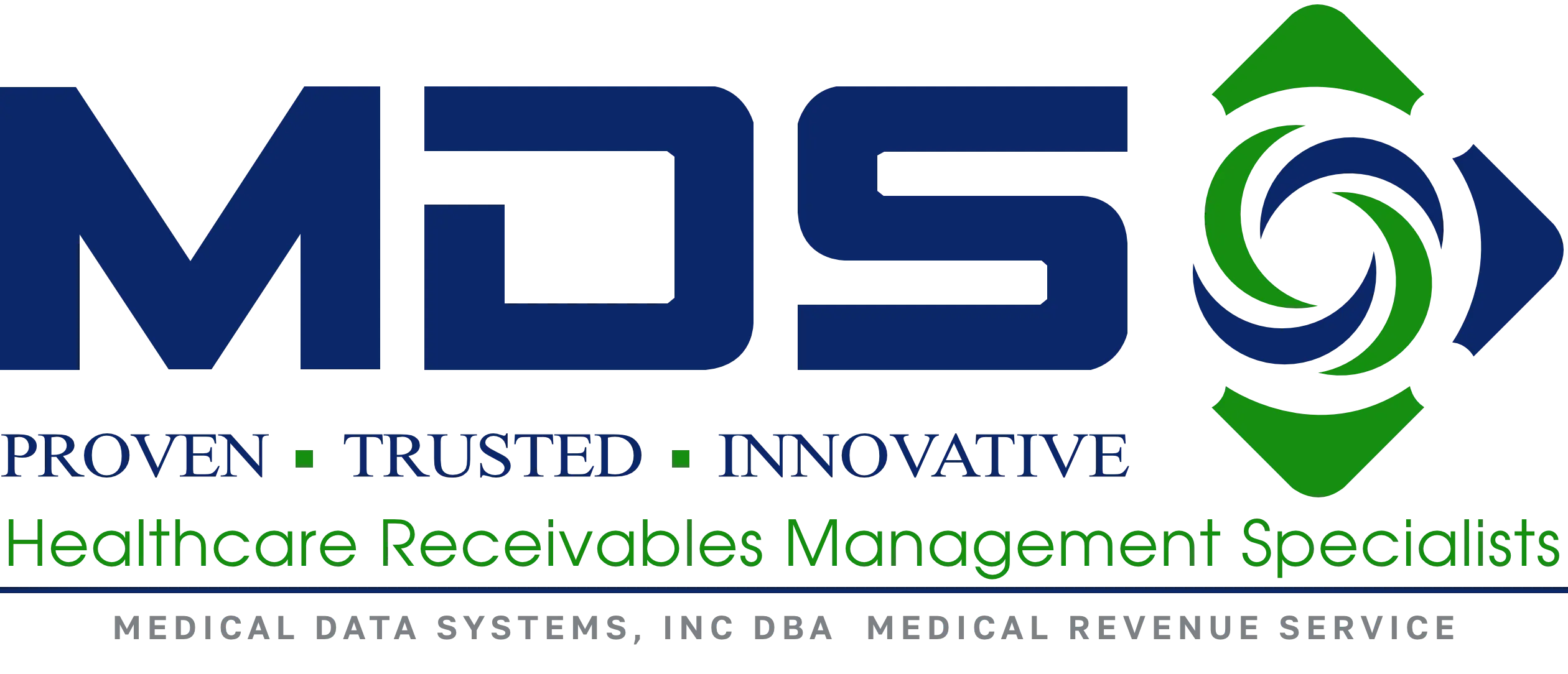
The primary goal of healthcare institutions is to deliver quality care and support patient well-being. But they also require timely bill payments to maintain operations and provide the necessary care.
That is why late payments and unpaid medical bills can pose a huge problem for healthcare providers. This is where medical debt collection comes into the picture.
In this blog, we go into the intricacies of how and why is medical debt collection important for healthcare providers.
What is Medical Debt Collection?

Medical debt collection is a process by which healthcare providers try to recover payment for unpaid medical bills from patients or third-party payers.
Healthcare providers such as hospitals, clinics, and private practices can hire a medical debt collection agency. Once the medical bills are in collections, the agency will contact the patients, establishing an open channel to discuss possible payment options and help them clear the outstanding debt.
Such agencies employ a wide range of medical debt collection strategies to help healthcare institutions recover their debt.
4 Ways Medical Debt Collection is Important for Healthcare Agencies
The healthcare industry faces unique challenges related to revenue collection and patient billing. In the USA, while the healthcare services are top-notch, it is also very expensive and involves complicated health insurance structures.
While this makes it difficult for patients, it is an even bigger problem for healthcare providers. They are ethically bound to give the best possible care to their patients. But this requires funds which can be tough to get if most patients and insurance companies do not settle their payments. These unpaid medical bills can pile up and become massive amounts of medical debt.
This is why, medical bill collection is crucial for healthcare institutions. By registering medical bills in collections, healthcare providers can get many advantages. Here are 4 reasons why medical debt collections is necessary for healthcare providers –
- Insurance Claim Denials: Insurance claim denials are common in healthcare. Insurance companies can deny a medical claim for various reasons such as incorrect information, lack of pre-authorization, or policy coverage limitations. In these cases, the healthcare provider is left with outstanding bills. They have to contact the patient to get the payment, which is a time-consuming process. Navigating the complex world of insurance claims, including claim denials, can be daunting and time-consuming. Medical debt collection can come in handy in such times, to figure out the legalities with the patients and the insurance companies.
- Unpaid Patient Balances: Patients have many financial responsibilities such as copayments, deductibles, and coinsurance, When patients fail to pay for the healthcare services availed on time, it can lead to unpaid balances. The healthcare providers need to settle these patient balances. Moreover, patients can often find it difficult to pay their bills in one go. Especially with the increasing cost of healthcare in the USA, patients require extra time to clear their medical debt. There are many processes involved in medical debt collections which can be difficult for the healthcare provider to manage on their own. Hiring an experienced medical debt collection agency can help with-
- Setting up a repayment plan considering the patient’s financial situation
- Keeping track of the payments
- Sending reminders and payment requests
- Contacting the patient in times of a missed payment
- Compliance and Regulations: The healthcare industry is highly regulated, and there are strict rules governing medical bill collections. These rules protect the rights of the patients while also helping healthcare providers like you recover their unpaid bills to sustain their operations. Moreover, in the case of bad debt or long-term unpaid accounts, you might need to take legal action to get payments. From registering the debt to the Credit Bureau to sending legal notices, this can be a lengthy, frustrating process. Hiring a collection agency for medical bills would be beneficial. A medical collection agency is knowledgeable about the ever-changing laws and regulations. They take action in accordance with the law so that both the healthcare providers and patients are treated fairly.
- Inefficient Billing Processes: Oftentimes, healthcare providers can face billing issues because of a not-so-right billing process. There can be an inefficient billing process because of a complex billing system, errors in documentation, or miscommunication with insurance companies. Inefficiencies in the billing and collections process can result in delayed or missed payments. A collection agency for medical bills can help you set up an efficient, automated billing system. Some agencies even help train your staff to streamline your entire billing operations. This will help manage your payments and improve overall revenue collection.
5 Reasons Why You Should Hire Medical Debt Collection Agency

Partnering with a medical debt collection agency can significantly benefit healthcare providers. Here are 5 reasons to hire a specialized medical debt collection company:
- Focus on Patient Care: Your primary focus is taking care of patients, ensuring proper care and quick recovery. Managing debt collection can be quite time-consuming. That is why outsourcing these tasks to medical debt collection agencies would help.
- Financial Stability: Medical care is not cheap. You need top-quality equipment, medicines, qualified staff, and more. Healthcare providers need a steady stream of revenue to maintain their operations. Collection companies are skilled at recovering outstanding balances swiftly, helping providers maintain financial stability.
- Specialized Expertise: Medical bill collections requires specific knowledge and skills. Different accounts require tailored tactics to ensure quick and easy medical debt payment. Collection agencies have the expertise needed to communicate with patients, insurance companies, and legal entities. Agencies tailor their collection strategies to the unique needs of each healthcare provider.
- Preventing Bad Debt: Timely and effective medical debt collection can help prevent accounts from becoming bad debt. Bad debt occurs when healthcare providers are unable to receive payments for a long duration. Preventing bad debt is crucial for maintaining financial stability and getting due payments for the services you provide.
- Patient Relationships Preservation: While you want to get the medical bills paid, it is also important to maintain a good relationship with your patient. Medical debt collection companies can maintain positive patient-provider relationships by handling sensitive debt-related communications.
Conclusion
The importance of medical debt collection for healthcare providers cannot be understated. From financial strain and unstable cash flow to administrative disruption and patient care, unpaid medical bills can create havoc.
Healthcare providers need to handle such situations with transparency, empathy, and honesty. It is advisable to work with a professional medical debt collection agency to ensure successful bill payment.
However, hiring a medical debt collection agency that upholds your reputation and is ethical in its operations is also very crucial, as they will represent your practice in the community.
Need help recovering your medical debt?
You can hand over your medical bills in collections to MDS. Using Artificial intelligence and automation, MDS streamlines the medical debt recovery process, so your team can tackle the toughest cases. Online and mobile-friendly payment solutions allow patients to pay in the manner they prefer instantly.
Contact us today to simplify debt collection for you and your patients!
